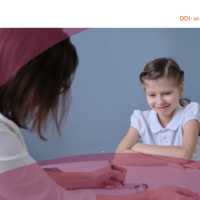Developmental language disorders
-

Do autistic girls talk differently about social groups?
New data, published in the Journal of Child Psychology and Psychiatry, suggest that pronoun use during natural conversation might inform us about clinically meaningful social function.
Read more -

Do autistic girls have better communication and interaction skills than autistic boys?
There is ongoing debate as to whether autism spectrum disorder (ASD) differentially affects males and females. Several meta-analyses have found little difference between males and females with ASD in terms of social communication and interaction skills. However, such analyses have often relied on diagnostic instruments such as the Autism Diagnostic Observation Schedule, Second Edition 2 that may not be sensitive to how autism presents in females. What’s more, many have been based on global scores, that reflect overall social communication and interaction skills, which could miss subtler differences in specific domains.
Read more -

A developmental language disorder might increase the risk of reoffending
Researchers in the UK are the first to identify the potential impact of a developmental language disorder (DLD) on reoffending risk in young people. Maxine Winstanley and colleagues recruited 145 young offenders to their study.
Read more -

Children with low language ability are at risk of a poor health-related quality-of-life
Ha Le and colleagues have examined the association between low language ability and health-related quality-of-life (HRQoL) in an Australian community-based cohort of 1,910 children assessed throughout childhood.
Read more -

Children with a language disorder are vulnerable to sexual abuse
Preliminary data suggest that children with language disorder may be at an increased risk of child sexual abuse (CSA),1,2 but few have studied the CSA experiences, disclosure patterns or reactions to disclosure in these children.
Read more -

Language impairment needs more recognition in the juvenile justice system
Language and communication impairments in adolescents in custody is much higher than in the general population, estimates range from 60-90% compared to 7-12%. A study from Nathan Hughes and colleagues has investigated co-morbidity of language difficulties in a cohort of 93 young male offenders (15-18 years) held in a secure custodial facility in the UK.
Read more -

Parents should keep talking to boost infant language development
Children from low socioeconomic status (SES) backgrounds tend to have poorer language skills when starting school than those from higher SES backgrounds. Now, data shows that increasing the amount of “contingent talk”— whereby a caregiver talks about objects that an infant is directly focusing on — within an infant’s first year of life promotes a wide vocabulary later in infancy.
Read more -

Processing speed determines dyslexia risk
Males exhibit a lower average reading performance than females, according to new data from Anne Arnett and colleagues. The researchers devised a framework to first validate the apparent sex difference in prevalence of dyslexia and then determine which cognitive correlates may underlie this difference.
Read more
